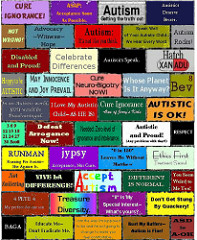You love people for who they are, not for who you want them to be.
Stick that in the back of your mind for a minute. Let’s move sideways to look at some other quotes. These are from Paula Kamen’s lovely book, All in my head: an epic quest to cure an unrelenting, totally unreasonable, and only slightly enlightening HEADACHE. One important thought is:
“There is a difference between getting cured and getting healed.”
Another is:
“Acceptance is not the same thing as resignation.”
These are very potent concepts, the sort that are easily-understood on the surface verbal level, but take longer to fully integrate through all the layers of one’s consciousness.
“Getting cured” means being rid of a medical or psychological problem to become healthy. In contrast, “getting healed” does not mean that one needs to be rid of the medical or psychological problem in order to move from merely surviving to living life fairly happily.
One can accept disability without being resigned to the concept that life is ruined because it will never be the way that was anticipated. Instead, one accepts that life will be different, and that this is okay.
When parents learn that their child has some kind of disability, they go through a sort of grieving process. They mourn the child they didn’t get or will no longer have. (In response, Jim Sinclair’s essay, “Don’t Mourn For Us” is a thought-provoking and reassuring essay for parents of autistic children.) Not everyone grieves in the same way, and not every parent experiences a lot of grief — sometimes there is more relief for having “figured things out” and being able to name, understand, and thus work with the difficulties or differences.
Sometimes parents get “stuck” in the blame and bargaining stages of grieving. They have not accepted the disability, and their child is not okay as a disabled person. In the denial is the core myth that somehow out there is a cure, and once they can fix the problem, then everything in their lives will be okay. The parents dwell upon the past and perceived injustices, and nothing less than total “cure” is acceptable. Sadly, this means that until the parent can announce the child is cured, then the child is not fully acceptable and loved as a full human being. This is devastating to the social, spiritual, and even physical development of the child.
In families that already dysfunctional from other issues, the disabled or different child can serve as a distracter from the real personal and interpersonal issues, and may get stuck in the rôle of the scapegoat: “things would be okay if it weren’t for this tragedy”.
When I say that, “You love people for who they are, not for who you want them to be,” that does not mean that one allows bad behaviour, or does not try to help a person with therapeutic or educational approaches that enable a person to achieve as much as possible. Rather, it means that you love the person for who and what they are, and that love is not conditional upon the person pretending to be something they are not.








Poto said,
2 February 2012 at 3:08
Once it stops being iilvsibne, it’s all of a sudden very, very visible. I guess it’s sort of like shaking hands with someone and suddenly realizing they have six fingers.This made me laugh. My scoliosis is very minor, but I have three fingers on one hand; when somebody asks if I’ve noticed, I say innocently, “What, there’s something wrong with my hands?” and lift them up so I can glance at them, ‘notice’ the deformed hand, and shriek in horror.Thank you for this post. The pictures from Flickr are beautiful and profound.
Centenary Retrospective « Andrea’s Buzzing About: said,
1 June 2007 at 23:06
[…] parents also need to understand that there is a difference between getting cured and being healed. The unresolved grief leaves parents susceptible to errors of judgment, and these well-intended but […]
capTAIN DANdy said,
8 February 2007 at 19:48
My autistic nephew moved in with us 8 years ago when my sister died. He was 16 at the time. We hooked up with other parents of students with disabilities including autism around education/”special ed.” issues.
“The break” or cure for autism was something these folks often talked about. It was (and is) frustrating to me that ‘pie in the sky’ was talked about when ‘here and now’ was on the table before us. Supports, accessability, and sanity in the community might remove the need for people to spend so much time and energy seeking “cures”.
Anna said,
1 February 2007 at 17:38
Re: Stoopid people:
OMG you have no idea. *tears hair out in frustration* *is now as mad as a wet yet bald hornet* *wishes she were hornet so she could sting people*
mcewen said,
26 January 2007 at 19:16
Fortunately my children don’t ‘pretend’ to be anyone else, even to please me. Rather, I think I am guilty of ‘typecasting them,’ due to my own expectations / prejudices. Luckily, they don’t let me get away with it for very long.
Cheers
MARIA LUJAN said,
26 January 2007 at 18:03
Hi Andrea
I do not think in terms of CURE of Autism or TREATMENT of Autism, with the actual knowledge of Science about autism. But at least for my son, he needed not only therapeutic and educational approaches, he needed also proper testing, diagnosis and treatment of several concomitant medical problems to the diagnosis of ASD..
and I love my son for who he is, We feel no blame, and autistics or not, every child deserves respect and love and to be grateful for him/her- but also the best medical support that can be found.
mumkeepingsane said,
26 January 2007 at 13:46
“Acceptance is not the same thing as resignation.”
Yes. Yes yes yes yes yes!
That is all. :)
houkhouse said,
26 January 2007 at 8:44
Beautifully written – and needed to be said. You’ve obviously hit a level of self-actualization that not everyone is really capable of achieving.
I stumbled upon this through tag surfer and really like what I’ve seen so far.
As a nurse of almost 16 years (peds, peds oncology, neonatal), I’ve come to understand and practice these type concepts as much as possible. I was told once that while medicine is the art of CURE, nursing is the art of CARE. This helps explain why I ditched the medical school idea and instead chose nursing, although I didn’t have words for it for many years. That statement helped me define it. I see now from yet another perspective that CURE and HEAL equally oppose each other for the patient.
My wish is that many can be healed in some capacity and be greatly cared for along the way and that ultimately “cure” becomes less of a focus.
Thank you for writing so nicely about such a difficult concept. I enjoyed it and I will be back for more. You can read about a bit of my recent nursing perspective at this post: http://dyingarts.wordpress.com/2007/01/12/from-the-outside-looking-in/
Warm wishes to you!
David N. Andrews M.Ed. (Distinction) said,
26 January 2007 at 6:48
Brilliant explanation of a very humanistic way of moving forward. Not sure the curebies will understand it: they do seem to have a volitional misunderstanding of things.
But I understand it, certainly, and it’s how my ex and I work with our daughter.